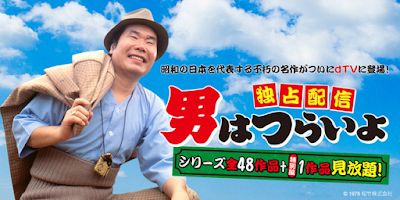March 01, 2018
The life of a salesman
The most beloved stereotype of the Japanese salesman is that of a mild-mannered carnival barker as portrayed in the long-running Tora-san movies. Persistent and endearingly ingratiating (almost to the point of being annoying). Not hard-sell.
The business of business-to-business—a popular subject of Japanese television melodramas—combines persistence and supplication in the face of rejection. The objective, it seems, is to be inoffensively irritating to the point that the other side caves to get rid of you.
Sort of like stalking. In a good way! Ganbaru—to patiently persist, endure, never give up—is intrinsic to the character of the ideal Japanese striver. A good salesman is NOT Alec Baldwin in Glengarry Glen Ross. That's how yakuza behave. That's why yakuza terrify the average Japanese.
In Japan, one such feared "hard sell" technique is known as "catch sales." It uses an aggressive approach (invading a person's space and getting in his face) to physically move the conversation to a "home ground" where the salesman controls every aspect of the interaction.
You know, like a church.
As I recount in Tokyo South, back during the late 1970s and early 1980s, Mormon missionaries deployed catch sales techniques with enormous success. In the short term. In the long term—well, by design, Mormon missionaries aren't around for the long term.
So the whole thing fell apart in a few short years. The catch sales approach treats people as disposable. The bird in the hand is never worth as much as two in the bush, and for good reason. It's a lot easier to sell the idea of joining a community than to create one.
Or as Groucho Marx famously said, "I don't care to belong to any club that will have me as a member." If it's that easy to join, why join? Besides, all Japanese already belong to a club. It's the Japanese club, and being a member is a full time job.
If you can sell that, then you are sure to "always be closing."
The business of business-to-business—a popular subject of Japanese television melodramas—combines persistence and supplication in the face of rejection. The objective, it seems, is to be inoffensively irritating to the point that the other side caves to get rid of you.
Sort of like stalking. In a good way! Ganbaru—to patiently persist, endure, never give up—is intrinsic to the character of the ideal Japanese striver. A good salesman is NOT Alec Baldwin in Glengarry Glen Ross. That's how yakuza behave. That's why yakuza terrify the average Japanese.
In Japan, one such feared "hard sell" technique is known as "catch sales." It uses an aggressive approach (invading a person's space and getting in his face) to physically move the conversation to a "home ground" where the salesman controls every aspect of the interaction.
You know, like a church.
As I recount in Tokyo South, back during the late 1970s and early 1980s, Mormon missionaries deployed catch sales techniques with enormous success. In the short term. In the long term—well, by design, Mormon missionaries aren't around for the long term.
So the whole thing fell apart in a few short years. The catch sales approach treats people as disposable. The bird in the hand is never worth as much as two in the bush, and for good reason. It's a lot easier to sell the idea of joining a community than to create one.
Or as Groucho Marx famously said, "I don't care to belong to any club that will have me as a member." If it's that easy to join, why join? Besides, all Japanese already belong to a club. It's the Japanese club, and being a member is a full time job.
If you can sell that, then you are sure to "always be closing."
Labels: introversion, japanese culture, japanese tv, movies about japan, social studies, tokyo south, yakuza
Comments


